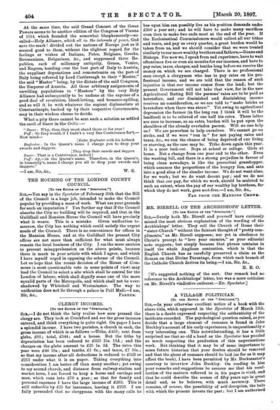CLERGY INCOMES.
[To THR EDITOR OP THE " BricrwroLl SAS,—I do not think the laity realise how sore pressed the clergy are. They look at Crockford and see the gross incomes entered, and think everything is quite right. On paper I have a splendid income. I have two parishes, a church in each, the gross income of which is as follows :—Tithe, £453 ; rent from glebe, £91; total, 2544 ; and a house. But the tithe by depreciation has been reduced to £323 15s. 11d.; and the charges on the glebe amount to £25 ls. 3d. The rates this year were £46 19s.; and tenths, £1 8s.; and taxes, £7 16s. ; so that my income after all deductions is reduced to £333 or £211 under what it is on paper. Taking everything into consideration I am better off than many another; yet owing to my second church, and distance from railway-station and market town, I am forced to keep a horse and carriage and man, which runs into £70 a year ; so that for family and personal expenses I have the large income of £263. This is still reducible by £25 for insurance, leaving it £238. I am fully persuaded that no clergyman with the many calls he
has upon him can possibly live as his position demands under £300 a year net; and he will have to make many sacrifices even then to make two ends meet at the end of the year. If the Ecclesiastical Commissioners would collect all our tithes and rents, and pay us every quarter, a great burden would be taken from us, and we should consider that we were treated similarly to our more wealthy brothers and fathers,—Deans and Bishops. For now we, I speak from sad experience, have to wait oftentimes five or even six months for our incomes, and have to pay rates, taxes, charges, and tenths long before we receive the money on which we are charged. There is no professional man except a clergyman who has to pay rates on his pro- fessional income, and we are told that the reason of such injustice is that our income comes from the land; but the present Government will not take that view, for in the new Agricultural Rating Bill the parsons' rates are to be paid as heretofore, and our diminished and diminishing income receives no consideration, so we are told to " make bricks as heretofore when there was straw." Yet owing to agricultural depression the farmer (in the long run I think it will be the landlord) is to be relieved of one half his rates. These latter are sure to increase, so an extra burden will be put upon the shoulders of the already overladen parson. Will no one help us ? We are powerless to help ourselves. We cannot go on strike, and if we were " run in " for not paying rates and taxes, &c., we run the chance of being deprived of our living or starving, as the case may be. Tithe down again this year. It is a poor look-out. Boys at school or college. Girls at home. Not a change from one year end to the other. Even the washing bill, and there is a strong prejudice in favour of being clean nowadays, is like the proverbial grasshopper, which assumes the proportions of the hungry lion, and eats into a good slice of the slender income. We do not want alms, for we work ; but we do want decent pay ; and we do not think that our pay, for which we work, should be mulcted to such an extent, when the pay of our wealthy lay brethren, for which they do not work, goes scot-free.—I am, Sir, &c.,
FIR FROM THE MADDING CROWD.






































 Previous page
Previous page